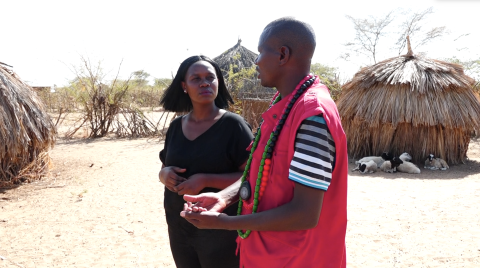
Dorcas Wangira, who reported on the harm caused by female genital mutilation and the hope offered by five tech-savvy teenage girls, has been named the 2019 winner of the Michael Elliott Award for Excellence in African Storytelling. A distinguished panel of judges selected the Kenyan journalist from among 218 applicants for this prize.
Her winning report, “The App and The Cut,” ran on KTN News in June 2018. In this 25-minute feature, Wangira traveled to communities where girls are forced to undergo the illegal procedure. She tells their stories of helplessness alongside the tale of five high school girls who invented an app to help girls facing the surgery seek help and find rescue centers. UNICEF estimates that at least 200 million girls and women have undergone female genital mutilation (FGM) worldwide, a large percentage from Africa.
The prestigious award is given by the International Center for Journalists (ICFJ) in partnership with ONE and the Elliott family. It was established in 2016 in honor of Michael Elliott, an outstanding editor and philanthropist whose life was a testament to the power of storytelling to bear witness to and improve the human condition.
The prize aims to advance the work of an emerging journalist covering Africa who strives to strengthen people’s voices and improve their well being. The inaugural winner was Kenyan health reporter Mercy Juma, whose stories shed light on sensitive topics, such as unwed teen mothers living in Muslim communities; the second winner was Nigerian journalist Abubakar Ibrahim, who wrote of the human toll of terrorism and displacement.
Wangira, based in Nairobi, is a feature writer for Citizen Television, Kenya’s leading television network. Specializing in social issues, health and science, her stated goal is to “put a human face on every story.” Previously, she was a special projects reporter and correspondent for KTN News, Kenya’s only 24-hour news network.
“The winning story stood out for its courageous reporting, and its fresh approach on a sensitive topic,” said Emma Oxford, Elliott’s widow. “Wangira examined the challenge of eradicating FGM, yet gave hope that tech-savvy young women in Kenya are finding new ways to support girls at risk.”
Judges also commended as a finalist Brigitte Perenyi, a storyteller and documentary film producer in Ghana, for her documentary, “My Stolen Childhood,” on the “trokosi” practice in West Africa where girls are forced into servitude to priests to pay for the perceived sins of family members. A trokosi survivor freed 20 years ago, Perenyi narrated the film and traced her own journey to learn why her family gave her away. The story was aired by BBC Africa Eye.
“Mike (Elliott) would have been delighted by the range of talent displayed by the entrants for this year’s award, in both broadcast and print media,” added Oxford. “The Elliott family, along with ONE, ICFJ and many generous supporters, are proud to help advance the development of quality journalism in Africa. I am very grateful to the staff of ICFJ and my fellow judges for their thoughtful review of the diverse entries.”
Wangira will receive the Elliott award and a cash prize at a reception in New York on May 21. She also will spend time in U.S. newsrooms to learn new skills and share knowledge in an intensive, customized program run by ICFJ. In addition, she will complete a two-week internship at The Economist’s headquarters in London. The goal is to help to deepen future reporting that engages and empowers Africans.
The international panel that selected Wangira was chaired by Norman Pearlstine, executive editor of the Los Angeles Times, and included:
Joyce Barnathan, president, ICFJ
Matthew Bishop, managing director, The Rockefeller Foundation
Erik Charas, Founding and managing director, Charas LDA, and member of ONE’s Africa Policy Advisory Board
Kate Critchley, executive director, global communications, ONE
Nic Dawes, deputy executive director for media, Human Rights Watch, and member of ONE’s Africa Policy Advisory Board
Jamie Drummond, executive director, global strategy, ONE
Daniel Franklin, executive editor, The Economist
Abubakar Ibrahim, 2018 Elliott Award winner and news editor of Daily Trust, Abuja, Nigeria
Mercy Juma, inaugural Elliott Award winner and a reporter for BBC Africa
Rik Kirkland, partner, Global Publishing, McKinsey & Company
Emma Oxford, author, “At Least We Lived”
Elliott served as a top editor at The Economist, Newsweek and Time before becoming CEO of ONE. A passionate writer and editor with a gift for unraveling complex issues, he shone a light on global development issues and the people at their center. A longtime board member of ICFJ, Elliott championed great journalism as a tool for empowerment. As ONE’s CEO, he lobbied to improve the lives of all Africans. Shortly before his untimely death in 2016, he spoke of his dream to establish an award that would bring together his belief in great journalism with his commitment to progress in Africa.